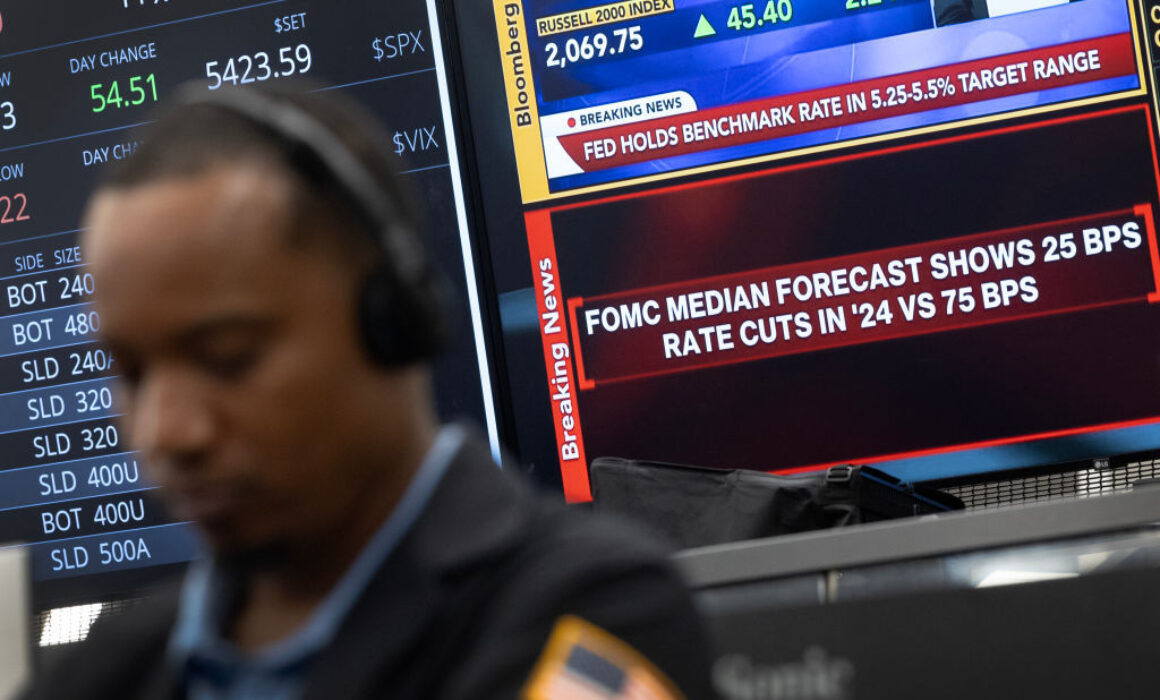Why the Fed Needs to Cut Interest Rates Now
August 22, 2024
The labor, housing, and climate reasons for lower rates.
The Roosevelt Rundown features our top stories of the week.
In June, the Fed revised its outlook for rate cuts to just one in 2024. (Photo by Scott Olson / Getty Images)
A Rate Cut Is Overdue
Despite declines in inflation and a cooling job market, the Federal Reserve has kept interest rates hovering above 5.25 percent—a 23-year high—since July 2023. Economists, advocacy groups, investors, and businesses are increasingly pressuring the Fed to reduce the federal funds rate, closely watching what Chair Jerome Powell may share at a speech scheduled for Friday. In a new blog post, Roosevelt’s Ira Regmi explains why it’s past time to cut rates.
First off, rates can be lowered because inflation is mostly under control—and was largely a result of supply-side pressures, making the Fed’s aggressive and protracted strategy of hiking rates already an overreaction. With job growth now slowing, lowering rates to preserve the impressive labor market gains of the past two years is imperative.
A cut could also help address challenges in the housing market—decreasing the cost of borrowing could help increase construction and make it easier to take out mortgages. Other industries that face high upfront costs, such as renewable energy development, could also invest more in major projects if interest rates went down. And the Fed’s decisions don’t just impact the United States—high interest rates have also exacerbated the debt burden on emerging economies.
“In a political-economy climate where the execution of crucial fiscal policy relies on political will and potential bipartisan support,” Regmi writes, “the option to use monetary policy to deal with recessions becomes even more important.”
While lowering rates is a must, it shouldn’t be deployed as a cure-all or without coordinated macro fiscal stabilizers. Monetary policy is a “blunt instrument that works with little precision” and “should be used with care,” Regmi cautions.
Still, “further delay in cutting rates risks harming the long-term health of the economy,” Regmi writes. “The consensus is clear: Interest rate cuts are long overdue.”
Read the blog post: “Why Progressives Want Lower Interest Rates, Explained.”
Welcoming Michael Madowitz, Roosevelt’s New Principal Economist
In a critical moment when progressive ideas about economics are taking root, the Roosevelt Institute is excited to have Michael Madowitz join the organization as the think tank’s first principal economist.
Madowitz will lead Roosevelt’s economic research and work with issue-area experts to drive a long-term paradigm change in our economy. Madowitz’s research focuses on macroeconomics, climate economics, energy markets, tax policy, and the impact of motherhood and childcare on the economy. In addition to his role at Roosevelt, Madowitz serves on the Data Users Advisory Committee for the Bureau of Labor Statistics.
“Michael is an incredible addition to our team. His background positions him to strengthen Roosevelt’s efforts to strategically make the economic case for the high-care, low-carbon economy we are working toward,” said Suzanne Kahn, vice president of Roosevelt’s think tank.
What We’re Talking About
In response to yesterday's ruling, our director of corporate power, @NikoLusiani says:
"Big business profits handsomely by locking in their employees into harmful non-competes. The Chamber is ecstatic." 🧵 1/3 https://t.co/NAH537cC43
— Roosevelt Institute (@rooseveltinst) August 21, 2024
What We’re Reading
Is Now the Right Time for Black Americans to Get Our Reparations? – feat. Roosevelt Senior Fellow William Darity Jr. – Ebony
Why the US Government Has No Business Building Its Own Bitcoin Reserve – feat. Roosevelt Fellow Todd Phillips – Fast Company
At Jackson Hole, Fed Faces Pivotal Test on Unemployment – Reuters
The FTC’s noncompete agreements ban is blocked – The Verge
